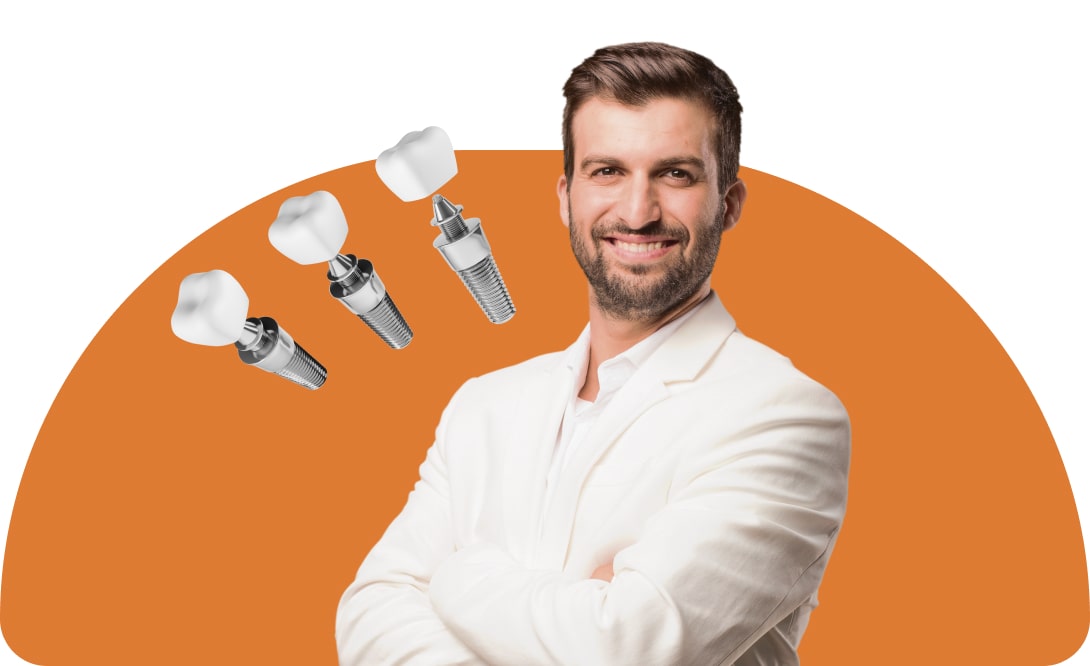What are Dental Implants?
An implant is essentially an artificial tooth. These biocompatible “replacement” teeth serve as a functional root, which then supports a fixed restoration like a crown, bridge, overdenture, or fixed hybrid denture (such as “All-on-4” types of designs.)
A modern dental implant is mirrored after natural tooth anatomy. It rests directly inside of your jawbone, essentially giving you new teeth that look, feel, and function the same (or better than) your previous smile.
Advantages of Dental Implant Treatment
Replacing missing teeth with implants allows your mouth to function the same way it did in years past. Once an implant is set into your bone, it’s essentially the same as having a new tooth all over again.
With dental implants you can enjoy:
Simple oral hygiene and home care
Replace as few or many teeth as necessary
Reduces bone loss and premature aging
Avoiding full or partial dentures
Best cost/return on investment
Multiple restorative options
Primary implant stability restores all your typical biting and chewing patterns. Each custom prosthetic—be it a crown, bridge, or something else—is designed by our cosmetic dentists/general dentist to naturally blend in with your smile. The results provide each patient with a tooth replacement alternative without the need to visit a specialist, such as a prosthodontist.
Procedure of Dental Implants
How Dental Implants Work
Dental implant treatment is so successful because of the way these “artificial teeth” integrate and fuse with your jaw bone. Your body’s bone tissues are naturally attracted to dental implants, forming a thin layer of bone over the surface of the restoration that permanently anchors them into place alongside natural teeth.

Types of Dental Implant Treatment
Single Tooth Implant and Crown
The process for replacing a single missing tooth is quite straightforward. We gently numb the gums and bone, then install an implant at that location. Once fully integrated, a custom porcelain crown is attached on top of the abutment. You’ll find that the daily dental care routine for a single implant is almost identical to that of a natural tooth.
Mini Dental Implants
When you lack adequate bone or space in your gum tissue, there may not be room to install a traditional implant. In this case, the solution is mini dental implants, which are less than half the size of conventional designs. An implantologist/dentist can place a mini implant in just one day, being that it’s not like traditional surgery nor does it follow the same osseointegration process.
A mini implant can be placed pain free with a small amount of numbing medication and requires little follow-up care. Typically, the restoration is placed and restored on the same day. Because of their limited integrity, mini implants are used less often in implant dentistry and only for an extremely limited range of cases
Multi-tooth Implant Bridgework
For our patients who need to replace 3-4 teeth at a time, our dentists can place a pair of implants to anchor a permanent dental bridge. This treatment eliminates the need to wear a removable partial denture. Each of the “teeth” on your restoration is designed to blend in with your overall smile.
Full Mouth Implant Treatment
Endosseous implant designs are placed directly into the jawbone and mirror the shape of natural teeth roots. Each of the restorations is implanted at specific points in the jaw, with as few as four implants total to anchor a fixed or stabilized denture. With a fixed hybrid denture, the design is streamlined to follow the curve of your jaw, rather than cover the roof of your mouth. The cost is more efficient than placing an implant at each location where there’s a missing tooth. Plus, it’s more comfortable than wearing a “plate” and is easier to talk and speak with.
Stabilized designs (sometimes called “overdentures”) are a removable alternative to fixed full mouth implants. These snap-on denture options clip onto special implant abutments for added security throughout the day.
Dental Implants Costs/Fees
When it comes to tooth loss, today’s dental implants offer the best return on investment for the total price of treatment. The actual cost of implant therapy and restorations will depend on things like the number of teeth missing, type of restoration you select, adjunctive jaw treatment (such as a bone graft,) and the total number of tooth implants.
During your initial consultation, our restorative dentists will work up a customized dental care plan that lists the time, costs, and replacement procedure involved. We’ll then work with your insurance to maximize the coverage options you’re entitled to, to reduce the price of implant care. From there, we’ll also discuss applicable financing options so that you can easily budget the cost of surgery on a month to month basis.

About Dental Implant Surgery
The implant procedure for replacing missing teeth can range from simple and straightforward to more complex (with bone grafting or adjustment to the gum tissue.) Since we provide comprehensive dental implant surgery in-house, there is no need to visit an offsite oral surgeon to complete your implant placement.
Getting teeth implants is a relatively minimally-invasive process that can be completed with as little as a small amount of local anesthetic (numbing medication.) Many people tell our implant dentist that implant placement is easier than having a tooth removed.
Implant dentistry typically requires a few visits across the span of 3-6 months. To ensure success post implant placement, we allow your bone to integrate with the implants and fuse them permanently into place. After a few months, a special titanium abutment is set into the implant, which will support a dental crown, fixed partial denture (bridge), or full arch multi-tooth restoration. We’ll fit you with a temporary restoration to wear (such as immediate overdentures or another artificial tooth) so that you don’t have to go with missing teeth throughout the process.
Qualifications for Dental Implantation
As a general dentistry service, most healthy people qualify for dental implants. During your initial consultation, we will review your health history, past dental care concerns, and measure both your bone and soft tissue levels. If we need to seek out medical advice or have you cleared by your physician, we will be able to do so.
People with healthy teeth and gums make the best implant candidates. However, we also offer bone graft and tissue graft options if you have had past resorption or gum disease.
It’s important that you do not smoke or use tobacco products, as they can delay healing and predispose you to implant failure. Our dental office will tailor a care plan to each patient to ensure a successful experience.
Home Care and Maintenance
It’s essential that you care for your new smile properly so that peri-implantitis (the implant form of gum disease) can be prevented. This infection is brought on by plaque buildup and gum inflammation. It is the leading risk of failure for implant dentistry and is strictly dependent upon your home care routine.
Daily brushing and flossing are crucial. We also recommend scheduling dental cleanings every six months to have your implants professionally looked after and your gum tissues evaluated.




